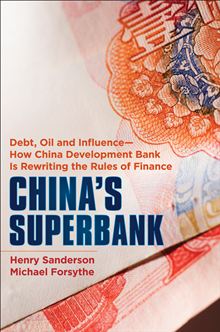
China’s Superbank. Debt, Oil and Influence – How China Development Bank is Rewriting the Rules of Finance. Wiley-Bloomberg Press, 2013
“In one decade”, the authors write, “China Development Bank (CDB) has become the financial enabler of both China’s global expansion and domestic boom.” The bank, according to Sanderson and Forsythe, lies at the heart of China’s model of state capitalism – and of what has, over the past years, been repeatedly called the “Beijing Consensus”. There are many different ways of seeking to understand China – Richard McGregor, in his excellent book on China’s Communist Party, makes a strong argument that the Party lies at the heart of China’s political system. Yet Sanderson and Fortsythe also have a point when they argue that in order to understand China at home and how it is influencing the world, examining China Development Bank is a good place to start.
The book does a relatively good job of explaining China Development Bank’s system of local government finance that helped urbanize China. Yet while their description of the Local Government Financing Vehicle (LGFV) seems to imply the model is the work of a genius (Chen Yuan), they also conclude that it is about to implode.
The authors’ informal writing style makes the – at times rather complex- topic accessible, but it also strikes the reader as somewhat annoying and unnecessary. For example, a Chinese official is quoted while “he sat with colleagues in a smoke-filled room under a No Smoking sign one early June day.” Another CDB official was “more interested in drinking beer than talking about how they would pay for their debt.” The China Development Bank, “where lunch breaks take two hours”, seems to be filled with undisciplined lazy bums – but then why is it the “superbank” the authors claim it to be?
The chapter about China Develoment Bank’s involvement in Africa is – quite naturally – more superficial than Deborah Brautigam’s fascinating The Gift of the Dragon: The Real Story of China in Africa, yet the authors show that it would be wrong to demonize China’s growing presence on the continent. In the end, they rightly assert that it is up to Africans to make the best use of capital available from the Chinese. The book heavily focuses on Ghana and Ethopia, two interesting case studies, yet it may have been interesting to hear about South Africa as well, a country whose relationship with China has become increasingly complex over the past decade.
The account of China’s presence in Venezuela, the country with one of the world’s largest proven oil reserves – is perhaps the book’s most interesting. China Development Bank is putting over $40 billion, about a third of its overseas lending, into Venezuela. How does it manage the risk associated to the investments, particularly considering Venezuela’s shaky record as a debtor? In order to avoid problems creditors faced in the past, CDB has assured that repayment is codified into Venezuelan law. Yet China is also careful to assure that its oil-for-loans scheme is seen in a positive light, so that its deals remain valid should the opposition ever come to power. Interestingly enough, China’s oil purchases in Venezuela are now so large that it resells parts of it on the global market – turning China into a major trader of oil in the Americas. The book seems to suggest that China benefits more from the agreement than Venezuela does – yet it also accuses CDB of hubris and ignorance regarding the South American country’s troubled history, implicitly predicting that China will face the same problems in Venezuela so many other investors have faced before.
Sanderson and Forsythe assert that at some point CDB will have to become more transparent. As any scholar who seeks to study China will notice early on, the authors report great difficulties to obtain clear information. CDB’s assets and lending, they say, are “a black hole in the global finance.” And indeed, several Chinese institutions have made progress in being more open, for example in the realm of development aid.
In their conclusion, the authors could have been more decisive in their assessment about in how far China Development Bank’s practices are sustainable, and – more importantly – in how far they offer a model for other country’s banks. Should CDB serve as an inspiration for other national development banks in the Global South? And, can the World Bank learn something by studying CDB? Considering China’s growing role in the global debate, and recent discussions about the creation of a BRICS Development Bank, the importance of such questions is set to increase.
Read also:
Book review: “The Party: The Secret World of China’s Communist Rulers” by Richard McGregor
Book review: “The Dragon’s Gift: The Real Story of China in Africa” by Deborah Brautigam
Book review: “What does China want?” by Matias Spektor and Dani Nedal (orgs.)








